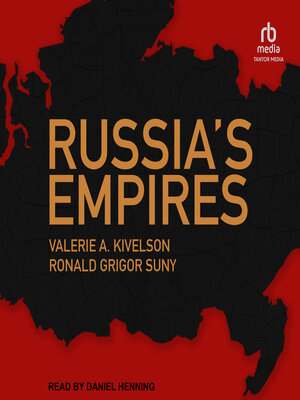
Sign up to save your library
With an OverDrive account, you can save your favorite libraries for at-a-glance information about availability. Find out more about OverDrive accounts.
Find this title in Libby, the library reading app by OverDrive.



Search for a digital library with this title
Title found at these libraries:
| Library Name | Distance |
|---|---|
| Loading... |
Russia's Empires analyzes how and why Russia expanded to become the largest country on the globe and how it repeatedly fell under the sway of strong, authoritarian leaders.
Authors Valerie A. Kivelson and Ronald Grigor Suny examine how imperial practices shaped choices and limited alternatives. Using the concept of empire, they look at the ways in which ordinary people imagined their position within a non-democratic polity—whether the Muscovite tsardom or the Soviet Union—and what concessions the rulers had to make, or appear to make, in order to establish their authority and preserve their rule.
Russia's Empires tackles the long history of the region, following the vicissitudes of empire—the absence, the coalescence, and the setbacks of imperial aspirations—across the centuries. The framework of empire allows the authors to address pressing questions of how various forms of non-democratic governance managed to succeed and survive, or, alternatively, what caused them to collapse and disappear. Studying Russia's extensive history in an imperial guise encourages students to pay attention to forms of inclusion, displays of reciprocity, and manifestations of ideology that might otherwise go unnoted, overlooked under the bleak record of coercion and oppression that so often characterizes ideas about Russia.
Authors Valerie A. Kivelson and Ronald Grigor Suny examine how imperial practices shaped choices and limited alternatives. Using the concept of empire, they look at the ways in which ordinary people imagined their position within a non-democratic polity—whether the Muscovite tsardom or the Soviet Union—and what concessions the rulers had to make, or appear to make, in order to establish their authority and preserve their rule.
Russia's Empires tackles the long history of the region, following the vicissitudes of empire—the absence, the coalescence, and the setbacks of imperial aspirations—across the centuries. The framework of empire allows the authors to address pressing questions of how various forms of non-democratic governance managed to succeed and survive, or, alternatively, what caused them to collapse and disappear. Studying Russia's extensive history in an imperial guise encourages students to pay attention to forms of inclusion, displays of reciprocity, and manifestations of ideology that might otherwise go unnoted, overlooked under the bleak record of coercion and oppression that so often characterizes ideas about Russia.







